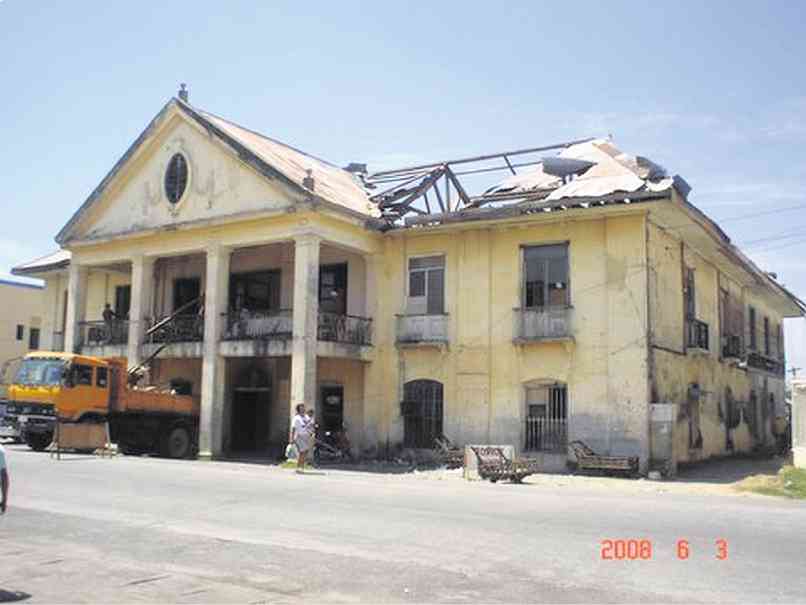‘Royal house’ back to life

LANDMARK Lingayen’s Casa Real, seen in photo after a storm blew its roof off in 2008, is currently being restored. CONTRIBUTED PHOTO
IN LINGAYEN, the capital town of Pangasinan province, a historic but long abandoned house is coming back to life.
Casa Real (royal house) at the heart of the town was built in the 1840s by the Spanish colonial government to serve as Pangasinan’s seat of government. The alcalde mayor held office there as head of the provincial government and as judge of the local court. It was also his official residence.
But in 1918, the American colonial government built a capitol building, stripping Casa Real of its political stature.
Casa Real was unscathed when bombs fell during World War II. It was not even shaken by earthquakes. But it did not survive Typhoon “Cosme” (international name: Halong), which literally blew the house down in May 2008.
Reduced to a shell, the 200-year-old structure was neglected until the government decided to restore it, using local and national funds and allocations from the Tourism Infrastructure and Enterprise Zone Authority (Tieza).
Historical landmark
The National Historical Commission of the Philippines (NHCP) declared Casa Real a historical landmark, describing the building as “an outstanding and unique example of civic architecture from the Spanish colonial period … [which] to this day [is] a beautiful monument to the artistry, craftsmanship and ingenuity of the builders.”
One of the early public edifices built with bricks and stones, the two-story Casa Real is sandwiched by the municipal building and the carcel (provincial jail), another historical landmark. It used to have thick brick walls, ornate ceilings, a staircase made of piedra china (granite stone) and wooden balustrades.
During the 1898 revolution, Spanish soldiers and some Filipinos, recruited to fight the Katipuneros, barricaded themselves in the building.
The Katipuneros tried to capture the building by crossing the Agno River at the rear and converging at the nearby Baraca Street. But they were massacred.
Casa Real was later used as a public elementary school. It became a Juzgado or the Court of First Instance, housing two branches and other court offices. After the courts moved out in 1996, government agencies had their offices in Casa Real until 2008.
Restoration
Before the restoration of Casa Real could start, a hundred families, who lived at the back of the property, had to be relocated.
Putting new roof and walls for the building required several agencies to chip in.
The provincial government allocated P5 million for the first phase of reconstruction. The 2016 national budget set aside P30 million for the ongoing second phase, which involved re-roofing and tiling of floors. Tieza earmarked P50 million for the third phase.
NHCP had been supervising and monitoring every step of the reconstruction, said Malou Elduayan, head of the provincial government’s tourism department.
Since the 1940s, Casa Real’s roof was made of cogon grass, according to research by Arabella Arcinue, a local historian. Arcinue, who heads the Provincial Heritage Society Inc., said her group was able to keep some of Casa Real’s original components, like doors and wood trusses, which would be used for the restored building.
When the reconstruction is completed, the government plans to convert Casa Real into a museum.